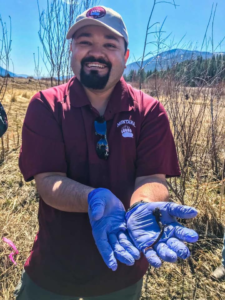SOU recognized as Tree Campus USA
(Ashland, Ore.) — Southern Oregon University was recognized this month as a Tree Campus USA for the seventh consecutive year.
Tree Campus USA, an Arbor Day Foundation program started in 2008, honors higher education institutions and their leaders for promoting healthy trees and engaging students and staff in the spirit of conservation. SOU is one of 392 U.S. colleges and universities to receive the most recent recognition and one of seven in Oregon.
“Over the past year, many have been reminded of the importance of nature to our physical and mental health,” Dan Lambe, president of the Arbor Day Foundation, wrote in a letter to SOU President Linda Schott.
“Your campus trees provide spaces of refuge and reflection to students, staff, faculty and the community,” Lambe said.
SOU earned the Tree Campus designation by fulfilling the program’s five core standards for effective campus forest management: a regular observance of Arbor Day, sponsorship of student service-learning projects and establishment of a tree advisory committee, a campus tree-care plan and dedicated annual expenditures for the campus tree program.
The Tree Campus program for higher education institutions has spawned two similar programs – Tree Campus K-12 and Tree Campus Healthcare – and the Arbor Day Foundation president called upon recognized colleges and universities to lead by example in their areas.
“We hope your example inspires collaboration,” Lambe said.
SOU’s Arbor Day observance is run by the Landscape Services Department, which organized volunteers to plant 137 large trees and 24,000 plants around campus between 2014 and 2016,.
All trees planted at SOU’s Arbor Day celebrations are donated by Plant Oregon, a Talent nursery. SOU offers free t-shirts and lunches to its Arbor Day volunteers. Arbor Day is celebrated each year on the last Friday of April.
The Arbor Day Foundation is a million-member, nonprofit conservation and education organization with the mission of inspiring people to plant, nurture and celebrate trees. Tree Campus USA’s colleges donate money to support the Arbor Day Foundation’s Time for Trees initiative, which strives to plant 100 million trees in forests and communities by 2022.
-SOU-










 Gómez is proud of his family’s farm-working and immigrant roots, and that both he and his brother Edrik – who died in a
Gómez is proud of his family’s farm-working and immigrant roots, and that both he and his brother Edrik – who died in a 